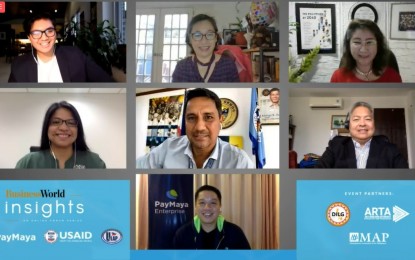
E-COMMERCE. Creating Digital Ecosystems to Jumpstart Local Economies webinar on Tuesday (Aug. 11, 2020) is graced by speakers (from top center) Trade Assistant Secretary Jean Pacheco, National Economic and Development Authority Undersecretary Rose Edillon, Go Negosyo Senior Adviser for Angat Lahat sa Digital Alliance Jopin Romero, Ormoc City Mayor Richard Gomez, USAID E-PESO Program Chief of Party Mamerto Tangonan, and PayMaya Enterprise Head for Public Sector Marvin Santos and moderated by BusinessWorld Digital Platform Editor Santiago Arnaiz. The Department of Trade and Industry targets micro, small and medium enterprises (MSMEs) to adopt digital commerce for their businesses to thrive.
(Screengrab from webinar via PNA)
MANILA – The Department of Trade and Industry (DTI) targets micro, small and medium enterprises (MSMEs) to adopt digital commerce for their businesses to thrive amid a challenging environment due to the coronavirus disease 2019 (Covid-19) pandemic.
In a webinar Tuesday, DTI Assistant Secretary Jean Pacheco said the department is crafting an e-commerce roadmap which aims to improve market access for MSMEs, prepare them for digital transformation, and make logistics efficient and at a lower cost through integration.
Pacheco encouraged businesses to tap the potential of digitalization, as one can start his online businesses through social media and can further expand to other online platforms.
She added e-commerce is also borderless where one can buy and sell anywhere and can create sales 24 hours.
Maintaining cost for an online store is also 10 times lower than a physical store, the DTI said.
“Covid-19 has accelerated the adoption of online transactions in the country,” Pacheco said.
She said business registrations in online retail surged when the Covid-19 hit the country and the government implemented community quarantine measures.
As of Aug.10, business registration related to online retail grew to over 68,000 from around 1,700 registrations in January to March 2020.
More than 33,000 of the total business registrations of online retailers were listed in the month of June alone, Pacheco said.
“For market access, the opportunity for Philippine businesses is huge, and we’re mindful of these following statistics: the Philippines, our total retail sales is valued at USD63 billion, while e-commerce accounts for less than 4 percent valued at USD2.
4 billion,” Pacheco said.
She added global e-commerce sales reached USD3.34 trillion with 4.57 billion active internet users.
The Philippines has the most number of mobile subscriptions at over 120 million.
However, time spent by Filipinos for online buying and selling is just 10 percent, she said.
Moreover, the e-commerce roadmap aims to reduce the logistics cost and make the system more efficient.
“In our roadmap, we introduced a simple strategic framework with three major elements — security, speed, and structure resulting in sales,” Pacheco said.
She underscored that with the directive of President Rodrigo Duterte in his fifth state-of-the-nation address to strengthen consumer protection including online transactions, the government is scaling up its e-commerce interventions.
The Chief Executive ordered concerned agencies to address risks related to security, data privacy, and misrepresentation in online transactions.






















